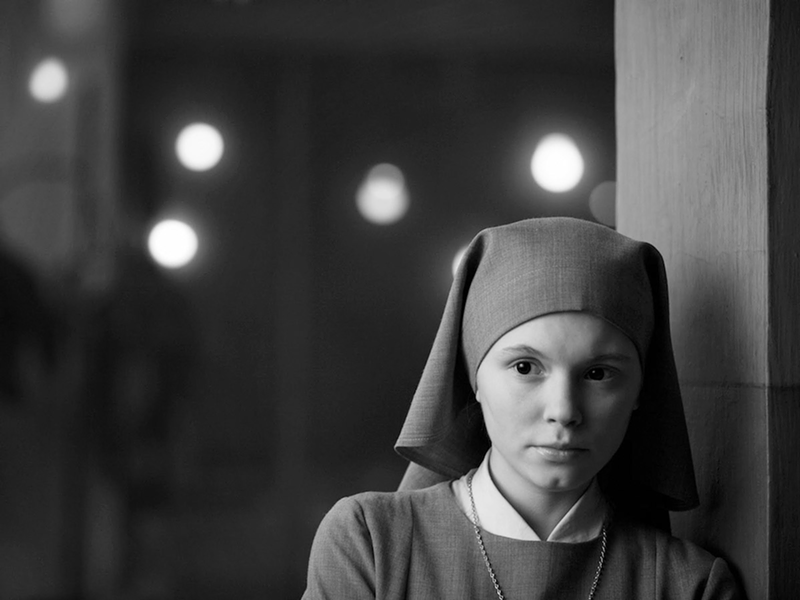Last year’s Toronto International Film Festival offered big ticket selections like Gravity and 12 Years a Slave that would go on to claim the lion’s share of the attention during the awards season; advance previews of titles like Don Jon, Prisoners and Rush seeking to grab some last minute buzz before their opening weekends; and intriguing question marks such as Richard Ayoade’s The Double, Denis Villeneuve’s Enemy and Arie Posin’s The Face of Love — a trio of stories playing on the theme of doppelgangers. But for all of my relative enjoyment of these films, I found myself caught completely unaware by the stark emotional honesty of Ida, the new release from Pawel Pawlikowski (The Woman in the Fifth), which is finally opening in our market.
The film starts off at some point in the 1960s with Anna (Agata Trzebuchowska), a young woman in a Polish convent preparing to take her final vows to become a nun, who is given the chance to meet a long-lost family member before officially joining the order. Having been raised in the convent as an orphan, Anna assumed she had no family and had surrendered to the life of ritualistic structure and solemn obedience within the confines of the sisterhood. Reluctantly, she packs a few belongings and journeys to the address of her aunt, a woman named Wanda (Agata Kulesza) who sees her as an inconvenience and presents her with a startling truth that changes both of their lives.
Anna’s real name is Ida, and she’s the surviving child of a Jewish family that was hiding from the Nazis in World War II. Anna/Ida’s mother was Wanda’s sister, and the loss has haunted Wanda for 20 years. Wanda made it through the war and became a judge known for administering harsh sentences, while drinking and engaging in an ongoing series of dead-end one-night stands to dull the emotional pain. She is a well-worn blade that may no longer break the skin with its edge; instead she does so through the sheer force behind the assault. And yet, still close to the dangerous surface lies a dark smoldering beauty, the wasted possibility of what might have been.
Wanda, the hardened cynic, seems intent at first to stab away at Anna/Ida’s shell of an identity. The idea of a Catholic who’s a Jew or a devout believer in a world that God — if he ever even existed — has abandoned is too much for Wanda, but she gains no joy from the brutal bloodsport of mere teasing and taunting. It becomes clear that the secret of Anna/Ida’s identity also carries an unresolved bit of history for Wanda as well. And so, after initially dismissing her niece, Wanda tracks her down and joins her on a quest to find the final resting place of Anna’s mother.
The film marvelously presents two fascinating female characters and a pair of unnerving performances. Trzebuchowska, much like Adèle Exarchopoulos in Blue is the Warmest Color (another TIFF standout), commands the screen, but she does so in much different fashion. Pawlikowski shoots her in close, letting her face dominate the frame, yet she gives nothing to us; none of the raw emotion that Exarchopoulos oozed from her every pore. Trzebuchowska captures the non-judgmental air of a woman who has been locked away — outside and beyond everyday encounters — and thus, all Ida can do is observe human interactions. Engagement lies just beyond her, yet there are moments of dawning frustration in her exchanges with Wanda.
Kulesza, on the other hand, despite a certain stoniness to her countenance, bears Wanda’s scars proudly. During the journey with Anna/Ida, Wanda begins to crack, but she never drowns in the undertow of emotion seeking to drag her down. For instance, Kulesza’s version of a drunken Wanda refuses to become a bumbling mess; she takes it like a man, and not a big-screen notion of what a real man is. Her stiff upper lip is solid granite with an explosive core.
Pawlikowski’s gem is a black and white dream, European reserve with seething heat just below the surface, but it is also one of the more striking Holocaust films to emerge over the course of the last few years, because it focuses on the aftermath and the very real human consequences, far removed from the political ideologies and the overwhelming horrors and sheer magnitude of it all. Ida is a family’s story, a tale of finding and becoming something more than a survivor. (Coming soon to Mariemont Theatre) (PG-13)
Grade: A
CONTACT TT STERN-ENZI:
[email protected]


